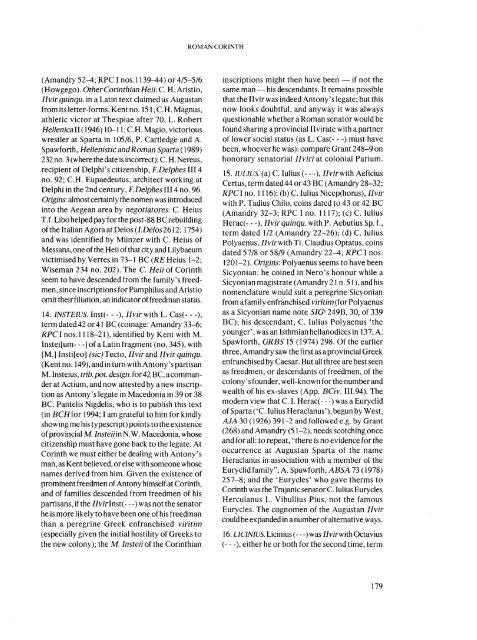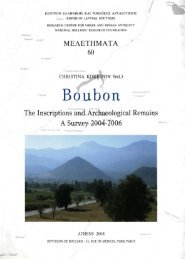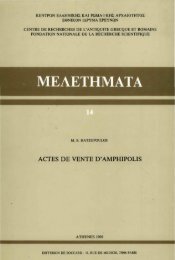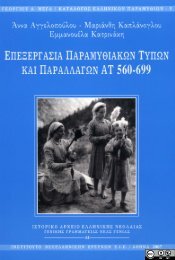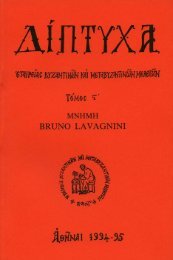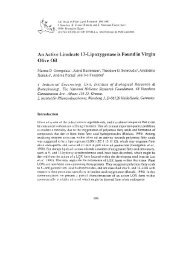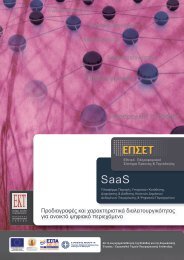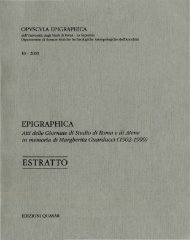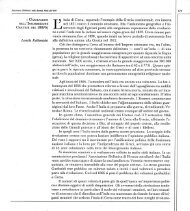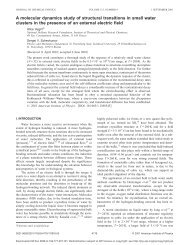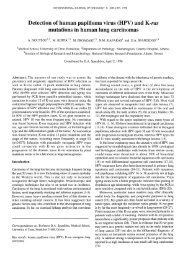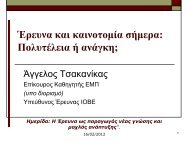Roman onomastics in the Greek East: social and political aspects ...
Roman onomastics in the Greek East: social and political aspects ...
Roman onomastics in the Greek East: social and political aspects ...
Create successful ePaper yourself
Turn your PDF publications into a flip-book with our unique Google optimized e-Paper software.
(Am<strong>and</strong>ry 52^; RPC I nos. 1139^4) or 4/5-5/6<br />
(Howgego). O<strong>the</strong>r Cor<strong>in</strong>thian Heii: C. H. Aristio,<br />
Ilvir qu<strong>in</strong>qu. <strong>in</strong> a Lat<strong>in</strong> text claimed as Augustan<br />
from its letter-forms, Kent no. 151 ; C.H. Magnus,<br />
athletic victor at Thespiae after 70, L. Robert<br />
Hellenica II (1946) 10-11; C.H. Magio, victorious<br />
wrestler at Sparta <strong>in</strong> 105/6, P. Cartledge <strong>and</strong> A.<br />
Spawforth, Hellenistic <strong>and</strong> <strong>Roman</strong> Sparta ( 1989)<br />
232 no. 3 (where <strong>the</strong> date is <strong>in</strong>correct); C. H. Nereus,<br />
recipient of Delphi's citizenship, F.Delphes III 4<br />
no. 92; C.H. Eupaedeutus, architect work<strong>in</strong>g at<br />
Delphi <strong>in</strong> <strong>the</strong> 2nd century, F.Delphes III 4 no. 96.<br />
Orig<strong>in</strong>s: almost certa<strong>in</strong>ly <strong>the</strong> nomen was <strong>in</strong>troduced<br />
<strong>in</strong>to <strong>the</strong> Aegean area by negotiatores: C. Heius<br />
T.f. Libo helped pay for <strong>the</strong> post-88 BC rebuild<strong>in</strong>g<br />
of <strong>the</strong> Italian Agora at Delos ( J.Dé/os2612; 1754)<br />
<strong>and</strong> was identified by Münzer with C. Heius of<br />
Messana, one of <strong>the</strong> Heii ofthat city <strong>and</strong> Lilybaeum<br />
victimised by Verres <strong>in</strong> 73-1 BC (RE Heius 1-2;<br />
Wiseman 234 no. 202). The C. Heii of Cor<strong>in</strong>th<br />
seem to have descended from <strong>the</strong> family's freedmen,<br />
s<strong>in</strong>ce <strong>in</strong>scriptions for Pamphilus <strong>and</strong> Aristio<br />
omit <strong>the</strong>ir filiation, an <strong>in</strong>dicator of freedman status.<br />
14. INSTEIUS. Inst(- - -), Ilvir with L. Cas(- - -),<br />
term dated42 or 41 BC (co<strong>in</strong>age: Am<strong>and</strong>ry 33-6;<br />
RPC I nos. 1118-21 ), identified by Kent with M.<br />
Instei[um- - -] of a Lat<strong>in</strong> fragment (no. 345), with<br />
[M.] Instifeo] (sic)Tecto, Ilvir <strong>and</strong> Ilvir qu<strong>in</strong>qu.<br />
(Kent no. 149), <strong>and</strong><strong>in</strong> turn with Antony's partisan<br />
M. Insteius, trib. pot. design, for 42 BC, acomm<strong>and</strong>er<br />
at Actium, <strong>and</strong> now attested by a new <strong>in</strong>scription<br />
as Antony's legate <strong>in</strong> Macedonia <strong>in</strong> 39 or 38<br />
BC. Pantelis Nigdelis, who is to publish this text<br />
(<strong>in</strong> BCHior 1994; I am grateful to him for k<strong>in</strong>dly<br />
show<strong>in</strong>g me his typescript) po<strong>in</strong>ts to <strong>the</strong> existence<br />
of prov<strong>in</strong>cial M. Insteii<strong>in</strong> N. W. Macedonia, whose<br />
citizenship must have gone back to <strong>the</strong> legate. At<br />
Cor<strong>in</strong>th we must ei<strong>the</strong>r be deal<strong>in</strong>g with Antony's<br />
man, as Kent believed, or else with someone whose<br />
names derived from him. Given <strong>the</strong> existence of<br />
prom<strong>in</strong>ent freedmen of Antony himself at Cor<strong>in</strong>th,<br />
<strong>and</strong> of families descended from freedmen of his<br />
partisans, if <strong>the</strong> Hvirlnst(- - -) was not <strong>the</strong> senator<br />
he is more likely to have been one of his freedman<br />
than a peregr<strong>in</strong>e <strong>Greek</strong> enfranchised viritim<br />
(especially given <strong>the</strong> <strong>in</strong>itial hostility of <strong>Greek</strong>s to<br />
<strong>the</strong> new colony); <strong>the</strong> M. Insteii of <strong>the</strong> Cor<strong>in</strong>thian<br />
ROMAN CORINTH<br />
<strong>in</strong>scriptions might <strong>the</strong>n have been — if not <strong>the</strong><br />
same man—his descendants. It rema<strong>in</strong>s possible<br />
that <strong>the</strong> Ilvir was <strong>in</strong>deed Antony's legate; but this<br />
now looks doubtful, <strong>and</strong> anyway it was always<br />
questionable whe<strong>the</strong>r a <strong>Roman</strong> senator would be<br />
found shar<strong>in</strong>g a prov<strong>in</strong>cial Ilvirate with a partner<br />
of lower <strong>social</strong> status (as L. Cas(—) must have<br />
been, whoever he was): compare Grant 248-9 on<br />
honorary senatorial Hviri at colonial Parium.<br />
15. IULIUS. (a) C. lulius (- - -), Ilvirmth Aeficius<br />
Certus,term dated44 or43 BC (Am<strong>and</strong>ry 28-32;<br />
RPCl no. 1116); (b) C. lulius Nicep(horus), Ilvir<br />
with P. Tadius Chilo, co<strong>in</strong>s dated to 43 or 42 BC<br />
(Am<strong>and</strong>ry 32-3; RPC I no. 1117); (c) C. lulius<br />
Herac(—), Ilvir qu<strong>in</strong>qu. with P. Aebutius Sp. f.,<br />
term dated 1/2 (Am<strong>and</strong>ry 22-26); (d) C. lulius<br />
Polyaenus, Hvirmth Ti. Claudius Optatus, co<strong>in</strong>s<br />
dated 57/8 or 58/9 (Am<strong>and</strong>ry 22-4; RPC I nos.<br />
1201-2). Orig<strong>in</strong>s: Polyaenus seems to have been<br />
Sicyonian: he co<strong>in</strong>ed <strong>in</strong> Nero's honour while a<br />
Sicyonian magistrate (Am<strong>and</strong>ry 21 n. 51), <strong>and</strong> his<br />
nomenclature would suit a peregr<strong>in</strong>e Sicyonian<br />
from a family enfranchised viritim (for Polyaenus<br />
as a Sicyonian name note SIGP 249B, 30, of 339<br />
BC); his descendant, C. lulius Polyaenus '<strong>the</strong><br />
younger', was an Isthmian hellanodices <strong>in</strong> 137, A.<br />
Spawforth, GRBS 15 (1974) 298. Of <strong>the</strong> earlier<br />
three, Am<strong>and</strong>ry saw <strong>the</strong> first as a prov<strong>in</strong>cial <strong>Greek</strong><br />
enfranchised by Caesar. But all three are best seen<br />
as freedmen, or descendants of freedmen, of <strong>the</strong><br />
colony's founder, well-known for <strong>the</strong> number <strong>and</strong><br />
wealth of his ex-slaves (App. BCiv. III.94). The<br />
modern view that C. I. Herac(- - -) was a Euryclid<br />
of Sparta('C. lulius Heraclanus'), begun by West,<br />
AJA 30 (1926) 391-2 <strong>and</strong> followed e.g. by Grant<br />
(268) <strong>and</strong> Am<strong>and</strong>ry (51-2), needs scotch<strong>in</strong>g once<br />
<strong>and</strong> for all : to repeat, "<strong>the</strong>re is no evidence for <strong>the</strong><br />
occurrence at Augustan Sparta of <strong>the</strong> name<br />
Heraclanus <strong>in</strong> association with a member of <strong>the</strong><br />
Euryclid family", A. Spawforth, ABS A 73 (1978)<br />
257-8; <strong>and</strong> <strong>the</strong> 'Eurycles' who gave <strong>the</strong>rms to<br />
Cor<strong>in</strong>th was <strong>the</strong> Trajanic senator C. lulius Eurycles<br />
Herculanus L. Vibullius Pius, not <strong>the</strong> famous<br />
Eurycles. The cognomen of <strong>the</strong> Augustan Ilvir<br />
couldbe exp<strong>and</strong>ed <strong>in</strong> anumber of alternative ways.<br />
16. LICINIUS. Lic<strong>in</strong>ius (- - -) was Ilvirmth Octavius<br />
(—), ei<strong>the</strong>r he or both for <strong>the</strong> second time, term<br />
179


